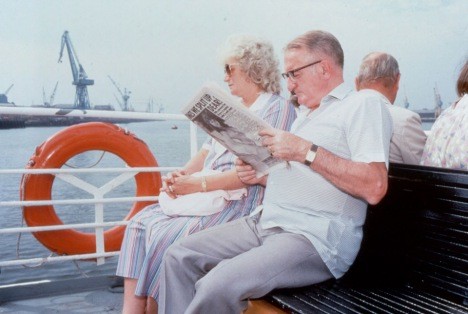Allan Sekula
Fish Story – Chapter 8: Dismal Science
16 Sep 2013 - 23 Mar 2014
This autumn’s Spotlight Display by Allan Sekula is part of a nine-chapter work exploring the shipping industry. This chapter consists of 80 colour slides documenting places of transit, trade, consumption and dereliction in Newcastle and Glasgow
Allan Sekula (1951–2013) was a renowned photographer, theorist, photography historian and critic. Since the early 1970s his work has challenged perceptions about the role of photography both as a visual art and as a documentary medium. Using photographs and slides in conjunction with text, Sekula’s work examines economic systems, trade, labour and globalisation. His projects derive from long periods of rigorous research inspired by contemporary politics.
Fish Story – Chapter 8: Dismal Science 1989–92 is one of nine ‘chapters’ that make up the series Fish Story, which comprises still photographs, slide projections and a book. Sekula spent seven years photographing international harbours and port cities around the world. Starting out in Los Angeles he travelled as far as Britain, Poland and Korea. The series looks at the ocean as a key space of globalisation, exploring global maritime industry and its role in the worldwide distribution of commodities.
Fish Story – Chapter 8: Dismal Science consists of 80 colour slides documenting places of transit, trade, consumption and dereliction in Tyneside and Glasgow, once the great ship-building cities of Britain. Presenting life among the ruins of an industrial waterfront, Sekula examines the ghosts of human labour and the obsolete capital of factories, warehouses and rusted machinery.
An Allan Sekula room is currently on display at Tate Modern (Room 4, Transformed Visions).
This display has been devised by curator Helen Delaney.
Allan Sekula (1951–2013) was a renowned photographer, theorist, photography historian and critic. Since the early 1970s his work has challenged perceptions about the role of photography both as a visual art and as a documentary medium. Using photographs and slides in conjunction with text, Sekula’s work examines economic systems, trade, labour and globalisation. His projects derive from long periods of rigorous research inspired by contemporary politics.
Fish Story – Chapter 8: Dismal Science 1989–92 is one of nine ‘chapters’ that make up the series Fish Story, which comprises still photographs, slide projections and a book. Sekula spent seven years photographing international harbours and port cities around the world. Starting out in Los Angeles he travelled as far as Britain, Poland and Korea. The series looks at the ocean as a key space of globalisation, exploring global maritime industry and its role in the worldwide distribution of commodities.
Fish Story – Chapter 8: Dismal Science consists of 80 colour slides documenting places of transit, trade, consumption and dereliction in Tyneside and Glasgow, once the great ship-building cities of Britain. Presenting life among the ruins of an industrial waterfront, Sekula examines the ghosts of human labour and the obsolete capital of factories, warehouses and rusted machinery.
An Allan Sekula room is currently on display at Tate Modern (Room 4, Transformed Visions).
This display has been devised by curator Helen Delaney.

